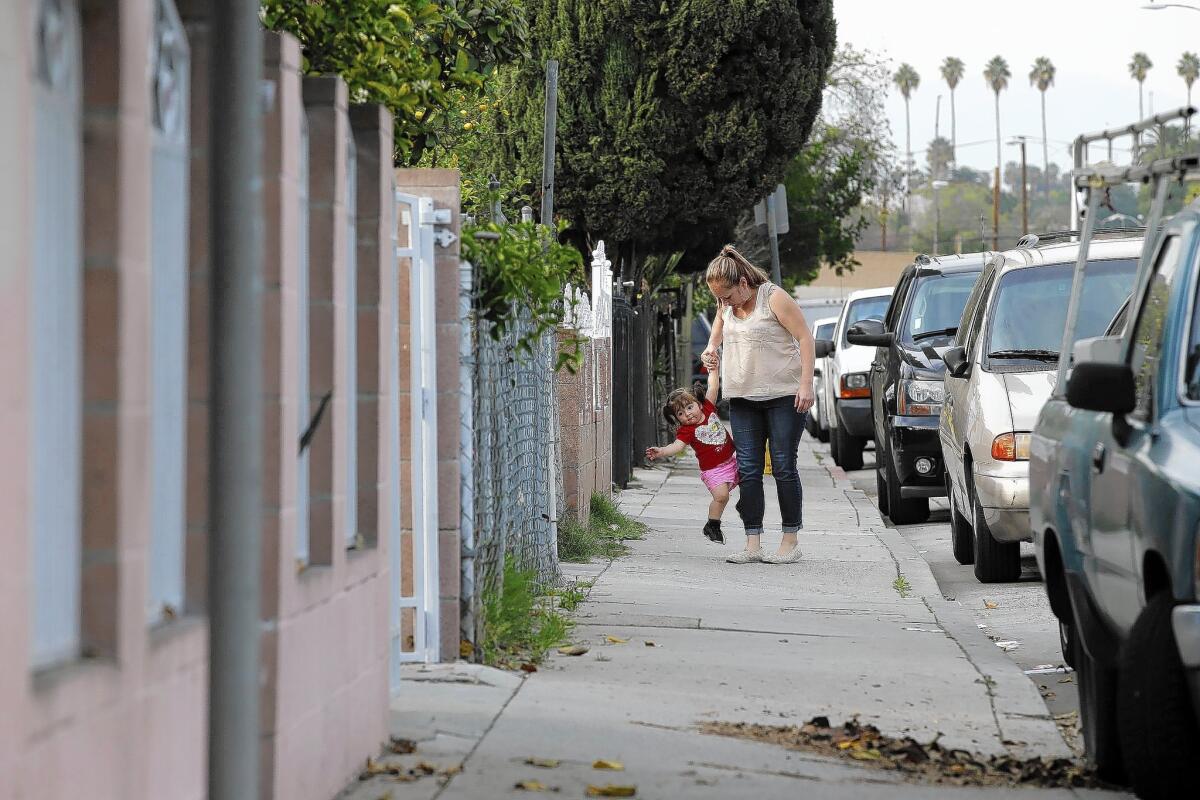L.A. County to create toxic pollution ‘strike team’

- Share via
Los Angeles County supervisors voted Tuesday to create a “strike team” that will target facilities that emit toxic pollutants — the first being the Exide Technologies battery recycling plant in Vernon.
The team of public health officials, prosecutors, fire department officials and others will look for ways to close the plant, which has been accused of endangering the health of more than 100,000 people with lead and arsenic emissions.
The state Department of Toxic Substances Control and the South Coast Air Quality Management District regulate the plant, but Supervisor Gloria Molina said she has grown frustrated with what she views as a lack of swift action to protect public health.
The board’s action came a day after state officials released reports showing that elevated levels of lead have been found in the soil of homes and a preschool near the plant. Officials warned residents in neighborhoods closest to the plant in Boyle Heights and Maywood to stay away from bare soil and grow vegetables only in raised beds.
“We are at the mercy of these state agencies who are unfortunately just not moving quickly enough to get us in the direction to shut down these toxic facilities,” Molina said.
Her motion calls for the county to “achieve closure” of the facility until it gets a final permit from the state; it has been operating on a temporary permit for years.
The county does not always have authority to crack down on polluters that are regulated by the state. Molina’s plan calls for county lawyers to “negotiate” with state officials so the county can act when public safety is at risk.
Air district and toxic substances officials said they welcomed the opportunity to work with the county, but disputed the idea that the state agencies are not doing their job.
Air District Executive Officer Barry Wallerstein released a letter in which he said his agency is “exercising its authority under state law to protect public health,” and noted that in the last six months the air district has sued Exide, seeking $40 million in penalties, and also filed a petition to temporarily shutter the plant. That petition is being reviewed by an independent hearing board of the air district.
Toxics department spokesman Jim Marxen said his agency “will take strong action to ensure Exide and other hazardous waste facilities operate within state and federal laws and regulations.”
Marxen noted that officials earlier this week ordered the company to carry out additional soil testing at homes around the plant, and to come up with a plan to protect children and pregnant women from lead exposure.
State officials are happy to work with county officials, he added, and often do, but the department “can’t delegate our … authority to regulate hazardous waste facilities.”
“If Exide cannot or will not operate within state and federal hazardous waste standards, we would be the first to take corrective action, up to and including shutting down the facility,” he said.
But some residents living near Exide have not been satisfied and applauded the county’s action.
Delores Mejia, a coordinator with the community group Eastside Coalition Against Exide, appeared at the meeting wearing a dust mask and carrying a cutout of a skull with the phrase “Exide Kills” written on it.
“I’m pleased that we’re taking the first step,” she said of the board’s action, although she said she thought the county needed to include community voices on the strike team and should set up an environmental ethics review board.
Exide officials, meanwhile, said the plant is making significant strides in controlling toxic emissions and has invested in upgrades to reduce pollution.
“The health of the community is our top priority,” said Exide plant manager John Hogarth, adding that the plant is a source of green jobs.
Beyond Exide, the strike force will also use a variety of state data to identify which communities have the greatest health risk due to toxic chemicals and which facilities are emitting pollutants in those communities.
Adrian Martinez, a lawyer with Earthjustice, said he was pleased that the county is attempting to take coordinated action.
“The real proof will come once we see what this team can accomplish,” Martinez said. “If we start seeing results, and cracking down on really bad polluters, then I think we should applaud them. But there is a lot more work we need to see.”
More to Read
Sign up for Essential California
The most important California stories and recommendations in your inbox every morning.
You may occasionally receive promotional content from the Los Angeles Times.














